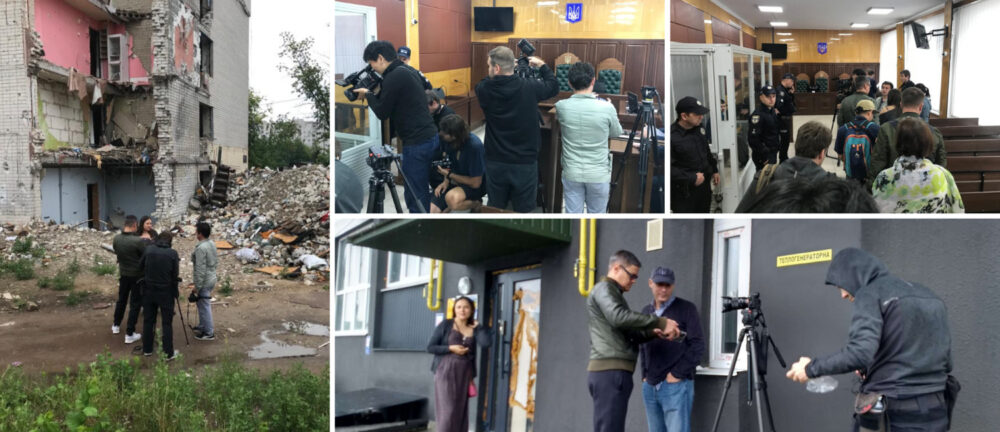Thierry Cruvellier and Franck Petit, from our media JusticeInfo.net, led a three-day training course in Kyiv to share their know-how and exchange with Ukrainian journalists on the coverage of war crimes trials, which started in Ukraine only three months after the Russian invasion.
As part of our response to the war in Ukraine, Thierry Cruvellier and Franck Petit, editors-in-chief of our media outlet JusticeInfo.net, organized a three-day training course for Ukrainian journalists. This was made possible thanks to funding from our partner Swiss Solidarity and private donors. The course focused on the journalistic coverage of war crimes trials.
The team of our media specialised on international justice went to Kyiv, the capital of Ukraine, to organize and run the workshop which took place from 15 to 17 July. Two Ukrainian journalists specialised in judicial reporting (Irina Salii and Serhyi Andrushko) as well as a national prosecutor (Viktor Mysiak) and a legal advisor to the investigations in Ukraine (Anna Mykytenko) intervened to animate certain modules, in addition to those prepared by Thierry Cruvellier and Franck Petit, notably on the protection of sources, the specificities of war crimes trials, or the conduct of interviews in a context of war-related traumas.
These activities have been particularly well received by the beneficiary journalists, who are facing an enormous challenge after an unprecedented upheaval for them.
“At the end of February, I felt like it was the end of my professional life. The courts were closed. I couldn’t imagine continuing what I was doing before. Not to mention the fear for my life. My whole world was destroyed, torn apart,” said Irina Salii, a journalist of the media Sudovyi Reporter who became a correspondent for JusticeInfo at the beginning of the project, during her speech on the first day of the training. But soon, after the surprise of the first war crimes trial in May, she was overwhelmed with work.
“This is a unique moment. You see in real time how [these trials] are going. You learn by doing. Every day is a first time, for us as well as for the prosecutors and judges,” continued the Ukrainian court reporter. It is an unfamiliar situation and poses several challenges: “It is clear that we need to share the experience of our coverage. We are the actors and potential victims of what we are talking about. We have acquaintances, friends who are affected, who are struggling. It is also a challenge for us, in terms of professional ethics, to remain impartial.“
Participants stressed the value and quality of the training, as Katerina Petrenko said in a Facebook post: “The world needs to know the full truth about Russian aggression in Ukraine. Professional journalists are needed for this. The trainers helped us to understand the judicial procedures in the national courts of Ukraine, the International Criminal Court, the International Court of Justice and the European Court of Human Rights. A practical discussion on justice during military conflicts was very useful, as well as discussions on the main dilemmas faced by our law enforcement officers, journalists and judiciary system“.
The conversations touched on some of the most sensitive and fundamental issues, Petrenko continued: “The most important discussion for me was how to do my journalistic work and combine it with a civic position. Is it possible to remain a journalist ‘outside the conflict’ when enemy’s bombs are exploding in your country, when your relatives are dying, when you are in a danger zone? Is it time for Ukrainian journalists to cover the war crimes committed by their own military, especially against Russian prisoners of war? Will some of the participants in the training course take the plunge? On the other hand, we are a state governed by the rule of law, with a free press and we should work for the interests of society as a whole. So why not? But if we write about this and the International Criminal Court actually prosecutes some of our soldiers, will we not be contributing to the destruction of the society we write for? These are important questions that need to be answered“.
She emphasised the special nature of this initiative: “It was incredibly interesting and instructive, unforgettable every time. This is not the first training of its kind, but the first one held while the war is going on and directly related to the war. I was happy to be with you and to receive valuable information which, I have no doubt, has strengthened me as a court reporter. This training has strengthened each of us as specialists in our field at a crucial time for the country“.
The support of the Justice Info editorial staff for their Ukrainian colleagues continues, as part of the project implemented by Fondation Hirondelle with funding from Swiss Solidarity and private donors. Every week, the editors of the online media coordinate and support the production of articles by Ukrainian correspondents, who publish them in their media in Ukraine and on the JusticeInfo.net website. Their contributions are available in 4 languages : Ukrainian, Russian, English and French. Further training and activities to support this legal coverage, which is crucial for the reconstruction of Ukrainian society, are planned for the coming months.

